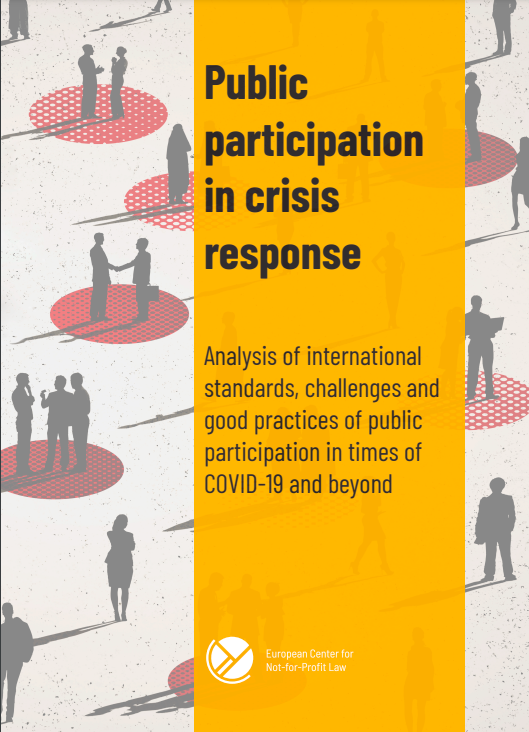Public participation in crisis response
This report by ECNL looks at the extent to which CSOs were able to participate meaningfully in decision making and what we can learn from existing good practices. It also provides recommendations on what is needed to further enhance the policy and standards of participation so that we can ensure that these rights can be meaningfully applied in crisis situations in the future.
Find out more about how public participation is key for emergency measures to:
- be based on evidence;
- take into consideration the impact on different sectors of the community, in particular the most vulnerable and marginalised;
- not to be disproportionate, overbroad, and counter-productive; and
- create more trust in and compliance with these measures.
"Participation in the design of responses to the crisis is a right, and is the smart thing to do." (Office of the High Commissioner for Human Rights, OHCHR, May 2020)
"The COVID-19 pandemic fundamentally undermined democratic processes including the right and access of individuals and organisations to decision-making and possibility to provide opinions or influence such processes. Civil society organizations (CSOs) and the public at large have rarely been consulted in the process of designing, implementing or reviewing the adopted emergency measures or subsequent laws aimed to stop the spread of COVID-19, including those that lead to the limitation of civil rights and freedoms. Additional challenges of addressing the economic and social fall out of the pandemic already emerged, leaving everyone question of how the ‘new normal’ should and will look like. It is important to remember and reflect why public participation is crucial for an effective response to the pandemic, and what is needed to prevent negative impact on our democratic societies and institutions in the short and long term."
ECNL's recommendations:
1. Engage civil society in inception, development, implementation and evaluation of pandemic or health-emergency related measures, including decisionmaking efforts related to whether or not to use digital technology for the management of the health crisis.
2. In addition to academic representatives, the various committees that provid advice to public authorities should include the representatives of specialized civil society and representatives of the groups most at risk.
3. Reinforce civic oversight of emergency measures, either through existing mechanisms (such as parliamentary oversight) or developing new inclusive and accessible (online) tools. Involve meaningfully in development and implementation of measures the organizations providing services to vulnerable and marginalized population (including elderly, migrants and refugees, remote and rural population, etc.). Provide relevant funding for such services as well as full access to those groups and places under clear or non-excessive regulations.
4. Reinforce the bottom-up initiative based on democratic deliberation. Give greater legitimacy to the citizen assembly and other forms of democratic deliberation, facilitated online or with social distancing measures, by providing and reinforcing the link between them and the national parliaments. The Covid-19 pandemic has shown that no state can act alone in the face of a health crisis of such a scale. It is the thousands of associations that have ensured the presence and facilitated the lives of millions of citizens. Will these actions be recognized by decision makers in the post-pandemic period and during a possible new pandemic crisis? Will associations and the non-profit sector be a priority for governments? We need to think about participation in a sustainable way and build an institutional support for a systemic participation which includes vulnerable and marginalized groups and effective assistance.
Read the full report here.
